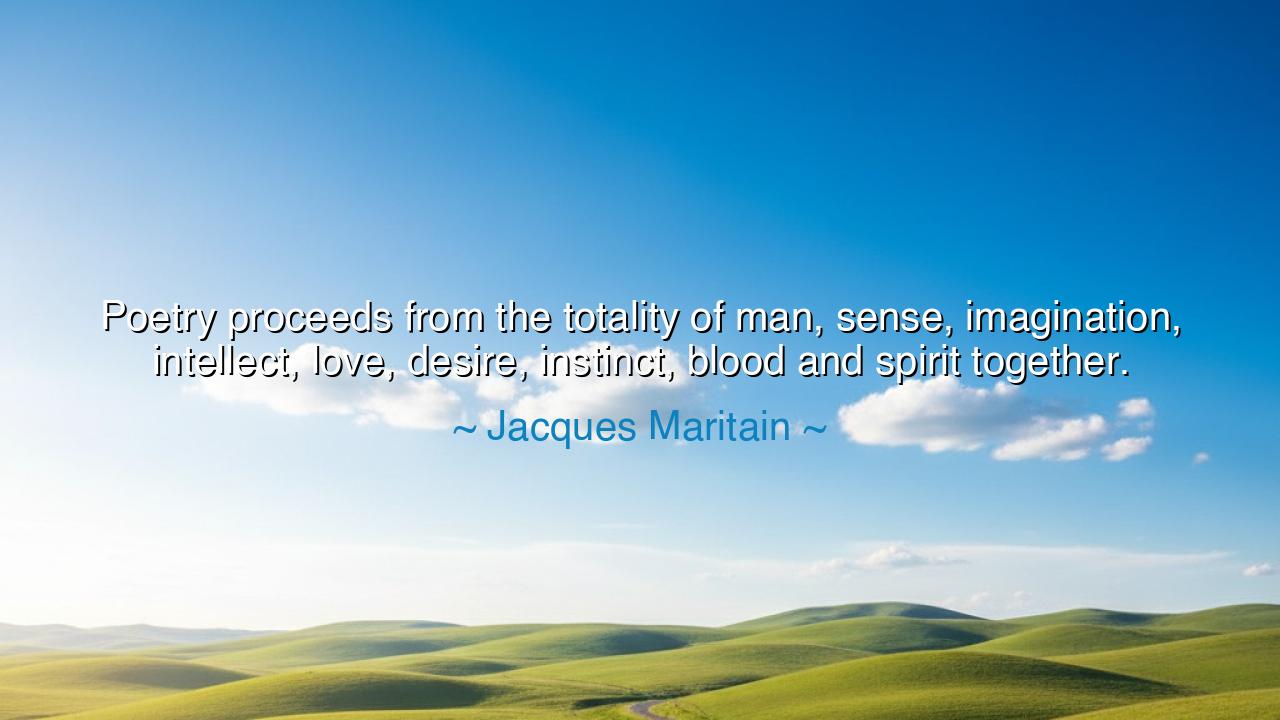
Poetry proceeds from the totality of man, sense, imagination
Poetry proceeds from the totality of man, sense, imagination, intellect, love, desire, instinct, blood and spirit together.






“Poetry proceeds from the totality of man — sense, imagination, intellect, love, desire, instinct, blood, and spirit together.” Thus spoke Jacques Maritain, a philosopher of luminous mind and sacred vision, whose words remind us that true poetry is not the craft of language alone, but the song of the entire being. It is not born from intellect alone, nor merely from emotion, but from the full chorus of the human soul. In these words, Maritain proclaims a timeless truth: that art, to be alive, must spring from the wholeness of our humanity — from the union of flesh and spirit, thought and passion, dream and instinct.
In the beginning, before the world was divided between reason and feeling, the poet was the bridge between gods and men. He spoke not only with his mind, but with his blood, his desire, and his imagination. His words were fire, music, and prayer all at once. Maritain’s vision restores us to that ancient understanding. He reminds us that poetry — and by extension, all true creation — is the flowering of our total being. To write, to paint, to build, even to love deeply, is to let every part of oneself join in harmony, as the instruments of a single divine symphony.
The sense gives poetry its shape — the smell of the rain, the taste of wine, the sound of footsteps in the night. The imagination gives it vision — it sees the invisible, it hears the silence. The intellect orders and refines it, giving meaning to the beauty that bursts from within. The love in the poet’s heart infuses warmth into the words; desire gives them motion, instinct gives them rhythm, blood gives them power, and spirit gives them immortality. Thus, when all these elements join together, a poem becomes not a mere work of art, but an incarnation of the human soul itself.
Consider the life of William Blake, that mystic poet who painted visions of heaven and earth entwined. His intellect wrestled with divine mysteries, his imagination saw angels in the sun, his instinct raged against tyranny, his blood burned with rebellion, and his spirit sang of eternity. He did not separate art from life; he lived as one aflame with all the forces of his being. From his totality came poems that still vibrate with cosmic energy. He stands as an example of what Maritain spoke of: a man whose poetry was not written by hand alone, but by heart, mind, and spirit united.
And yet, Maritain’s wisdom speaks not only to poets, but to all who seek to live fully. For poetry is not confined to verses on a page; it is the song that arises whenever we act from the fullness of our being. The mother who sings to her child, the craftsman who carves beauty into wood, the teacher who awakens light in another’s mind — all create poetry when they act with love, instinct, and spirit entwined. To live poetically is to live wholly, refusing to let any part of oneself — the body, the intellect, or the heart — fall silent.
Beware the half-life, the divided existence. The one who thinks without feeling becomes a machine; the one who feels without thought drifts like a leaf in the wind. The true human, says Maritain, is one who integrates all — whose sense is awake, whose intellect is alive, whose imagination burns bright, whose blood pulses with compassion and courage. Such a person does not merely live — they create, they illuminate, they bless.
The lesson, therefore, is this: cultivate the totality within you. Do not starve the body for the sake of the mind, nor silence the spirit in pursuit of reason. Feed your imagination with wonder, your intellect with truth, your heart with love. Let every part of your being contribute to your creation — whether that creation be a poem, a friendship, or a life. For when the whole man acts, his work carries the mark of eternity.
And so, as the ancients once said, “Know thyself” — but go further still: Be thyself, wholly. Let your poetry — in word or deed — rise not from a fragment, but from your fullness. When the sense, imagination, intellect, love, desire, instinct, blood, and spirit all speak as one, your voice will not merely echo in time — it will resound in the halls of the eternal.






AAdministratorAdministrator
Welcome, honored guests. Please leave a comment, we will respond soon